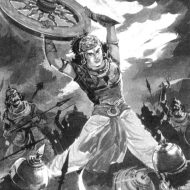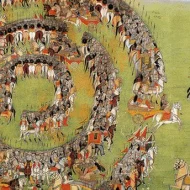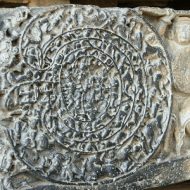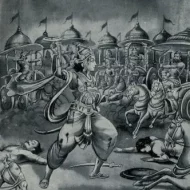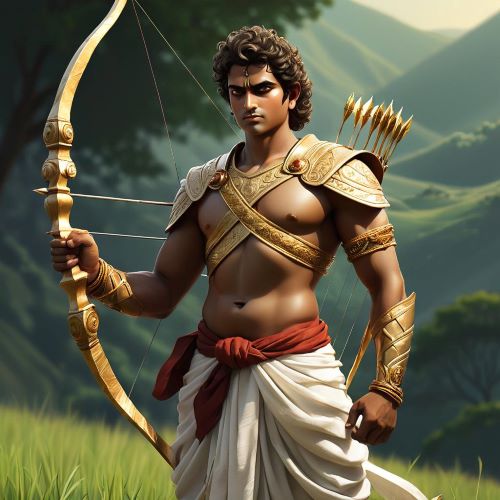Abhimanyu : The Fallen Prodigy
Listen
At a glance
| Description | |
|---|---|
| Origin | Indian Mythology |
| Classification | Demigods |
| Family Members | Arjuna (Father), Subhadra (Mother), Krishna (Uncle), Pandavas (Uncles) |
| Region | India |
| Associated With | Warfare, Weaponry |
Abhimanyu
Introduction
One of the most powerful warriors in the second generation of the Mahabharata was Abhimanyu. He was the child of Subhadra and Arjuna, and he was the nephew of Lord Krishna. He was also the husband of Uttara, the princess of the Matsya kingdom, and the father of Parikshita. Born with both fighting and courage abilities, Abhimanyu was modeled after his father, Arjuna, as well as Lord Indra. He was regarded as an equal of his father due to his achievements. When he was 16 years old, he participated in the Mahabharata war.
Since Arjuna and Krishna were not present at the time, Abhimanyu had to break through the Kaurava army’s chakravyuha. He was surrounded by a slew of Kaurava warriors, such as Dushasana, Duryodhana, and Drona. He was killed in battle due to his inexperience with extricating himself from the chakravyuha. Before he died, he courageously fought against the Kaurava warriors, and he displayed exceptional heroism.
Physical Traits
Subhadra’s son was a remarkable figure, known as Abhimanyu. He boasted long arms, a broad chest, and eyes as formidable as a bull’s. In battle, he seemed to disappear like a ghost, and his broad shoulders resembled those of a mighty bull. His face, broad and strong like a snake’s, exuded a sense of regal pride akin to a lion. Abhimanyu expertly wielded a large bow, displaying a prowess reminiscent of a raging elephant in rut. His visage was as handsome as the full moon, and his deep voice resonated like the beat of a drum or the rumble of thunderclouds. In terms of bravery, energy, beauty, and features, he stood shoulder to shoulder with the great Krishna himself.
Family
The Sambhava Parva, found within the Adi Parva, unveils the intriguing story behind the birth and untimely fate of Abhimanyu. This narrative traces its origin to a divine assembly where the gods proposed an extraordinary plan. They suggested that Varchas, the son of the lunar deity Soma, assume an earthly incarnation as Abhimanyu and contribute to the eradication of malevolent forces. However, Soma, reluctant to part with his beloved son, only consented to this proposal under the condition that Varchas would return to him once he reached the age of sixteen.
Abhimanyu, born to Arjuna, the third of the Pandava brothers, and Subhadra, who hailed from the Yadu clan, emerged as a central figure in this celestial arrangement. Arjuna initiated him into the intricacies of warfare, a journey that commenced before the Pandavas were compelled to relinquish their kingdom and endure thirteen years of exile at the behest of their cousin, Duryodhana. During this period, Subhadra sought refuge in the realm of Dvaraka, her brother Krishna’s abode, where she nurtured Abhimanyu with the support of her kin. Abhimanyu’s military education was enriched by the guidance of his uncles Balarama and Krishna, as well as his maternal cousin Pradyumna.
Other names
The name Abhimanyu, derived from Sanskrit, carries a profound meaning, signifying “one who is characterized by self-respect.” Alternatively, it can be interpreted as “heroic” or “fiery.” Within the context of the Mahabharata, Abhimanyu is described through several epithets, each shedding light on different aspects of his identity. Ārjuni – Signifying ‘son of Arjuna,’ highlighting his lineage and familial connection. Arjunātmaja – Meaning ‘son of Arjuna,’ emphasizing his direct descent from the valiant warrior Arjuna. Arjunāpara – Denoting ‘he who is equal to Arjuna,’ underscoring his remarkable prowess and capabilities that rivaled those of his father Arjuna.
Phālguni – Referring to ‘son of Phalguna (Arjuna),’ reinforcing his parentage and the renowned name of his father. Śakrātmajatmāja – Indicating ‘son of Indra’s son (Arjuna),’ emphasizing his divine heritage and lineage through Arjuna, who is considered an exceptional warrior and the son of the god Indra. Saubhadra – Meaning ‘son of Subhadra,’ highlighting his mother’s identity and familial ties. Janmavira – Describing ‘one who is brave from birth,’ signifying Abhimanyu’s innate courage and valor. These epithets collectively paint a vivid picture of Abhimanyu’s character, his noble lineage, and the exceptional qualities that defined him as a heroic and courageous figure within the epic Mahabharata.
Powers and Abilities
In the battle with Brihadbala, the king of Kosala, Abhimanyu faced off against him. During the conflict with Bhishma, he broke his enemy’s flagstaff. He then assisted his father, Arjuna, in facing off against the latter. The Mahabharata’s Bhishma Parva talks about the encounter between Abhimanyu and Lakshmana.He aggressively fought against the Gandharas, and he killed the King of Magadha Jayatsena and his elephant. Upon defeating Laksmana, he assisted the warrior Bhimasena.
In the beginning, he defeated Vikarna and Chitrasena. He then took the position of Vyuha created by Dhrishtyumna. He started fighting against Bhagadatta, and he also defeated Alambusha and Ambastha. He then faced Sudeshna, Duryodhana, Brionahadbala, and others. Drona planned to send Krishna and Arjuna to seek the Samshaptakha army, which was defeated by the latter. The Pandavas suffered a huge loss when the Kaurava army was grouped together in the giant discus formation. If this happened to continue, the Pandavas would not have an army by sunset.
Only Krishna and Arjuna were aware of how to break this formation. Because of this, all Pandava generals turned to the son of Arjuna, who was known as Abhimanyu. His story became prominent after he participated in the battle of Vyuha, which was fought by the Kaurava army. He was taught various types of warfare by Arjuna and Krishna. Pradyumna, who was Krishna’s son, also taught him. When in Subhadra’s womb, Abhimanyu learned how to break into Vyuha. It was during this period that Arjuna narrated the same to Subhadra.But he did not know how to destroy the formation once he was inside, as Subhadra fell asleep while listening to the story and Abhimanyu in her womb could learn only half of the technique.
When Abhimanyu broke the formation, Sindh’s ruler, Jayadratha, blocked the Pandavas. After suffering a humiliating defeat at the hands of the Pandavas, Jayadratha sought a boon from Shiva, which allowed him to completely completely hold back and counter-power, any army (except Arjuna and Krishna) for one single day of war. In the Vyuha, the trapped Abhimanyu carried out a killing spree. He wanted to carry out his original strategy and defeat the Kaurava army by himself. He also defeated several notable individuals such as Duryodhana, Ashwatthama, Bhurishrava, Shalya, and Duhshasana. He also killed the sons of Kritavarma, King Brihadbala, and Matrikavata.
A joint attack was then made on Abhimanyu. After a strategy was executed, a bow was cut off by Karna, and Kripa and Kritavarma killed their chariot-drivers. In addition, Abhimanyu took up a shield and a sword, but his weapons were cut off by Ashvatthama and Drona. He then threw a chariot-wheel at Drona, but the latter saved her by cutting the wheel. As he fought, he collected discarded weapons. In one of his most prominent victories, he employed a chariot-wheel to kill hundreds of warriors. He was eventually killed after being attacked from multiple sides. At the same time, the son of Duhshasana and Abhimanyu engaged in a fight using a mace.
Duhshasana woke up and attacked Abhimanyu, causing him to fall unconscious. Upon his death, Jayadratha kicked his body to confirm his death. This angered Arjuna, who had vowed to either kill Jaydratha or his father.
Modern Day Influence
Abhimanyu, a heroic character from the ancient Indian epic, the Mahabharata, has found resonance in modern pop culture through various references and adaptations. Abhimanyu’s character has been depicted in several Indian films and TV series that retell the Mahabharata. These adaptations showcase his bravery and valor, making him a beloved character in Indian cinema. Modern comics and graphic novels often draw inspiration from classical mythology. Abhimanyu’s character has made appearances in graphic adaptations of the Mahabharata, appealing to a younger and global audience.
In 1974, the establishment of INS Abhimanyu served as a tribute to the character of Abhimanyu. Subsequently, on May 1, 1980, the Premier Chariot Base in Mumbai was officially commissioned as the unit’s permanent base. INS Abhimanyu now houses the Indian Maritime Special Forces (IMSF), showcasing its critical role as the headquarters for this elite military unit.
Related Images
Frequently Asked Questions
What is lorem Ipsum?
I am text block. Click edit button to change this text. Lorem ipsum dolor sit amet, consectetur adipiscing elit. Ut elit tellus, luctus nec ullamcorper mattis, pulvinar dapibus leo.
What is lorem Ipsum?
I am text block. Click edit button to change this text. Lorem ipsum dolor sit amet, consectetur adipiscing elit. Ut elit tellus, luctus nec ullamcorper mattis, pulvinar dapibus leo.
What is lorem Ipsum?
I am text block. Click edit button to change this text. Lorem ipsum dolor sit amet, consectetur adipiscing elit. Ut elit tellus, luctus nec ullamcorper mattis, pulvinar dapibus leo.
What is lorem Ipsum?
I am text block. Click edit button to change this text. Lorem ipsum dolor sit amet, consectetur adipiscing elit. Ut elit tellus, luctus nec ullamcorper mattis, pulvinar dapibus leo.
What is lorem Ipsum?
I am text block. Click edit button to change this text. Lorem ipsum dolor sit amet, consectetur adipiscing elit. Ut elit tellus, luctus nec ullamcorper mattis, pulvinar dapibus leo.

